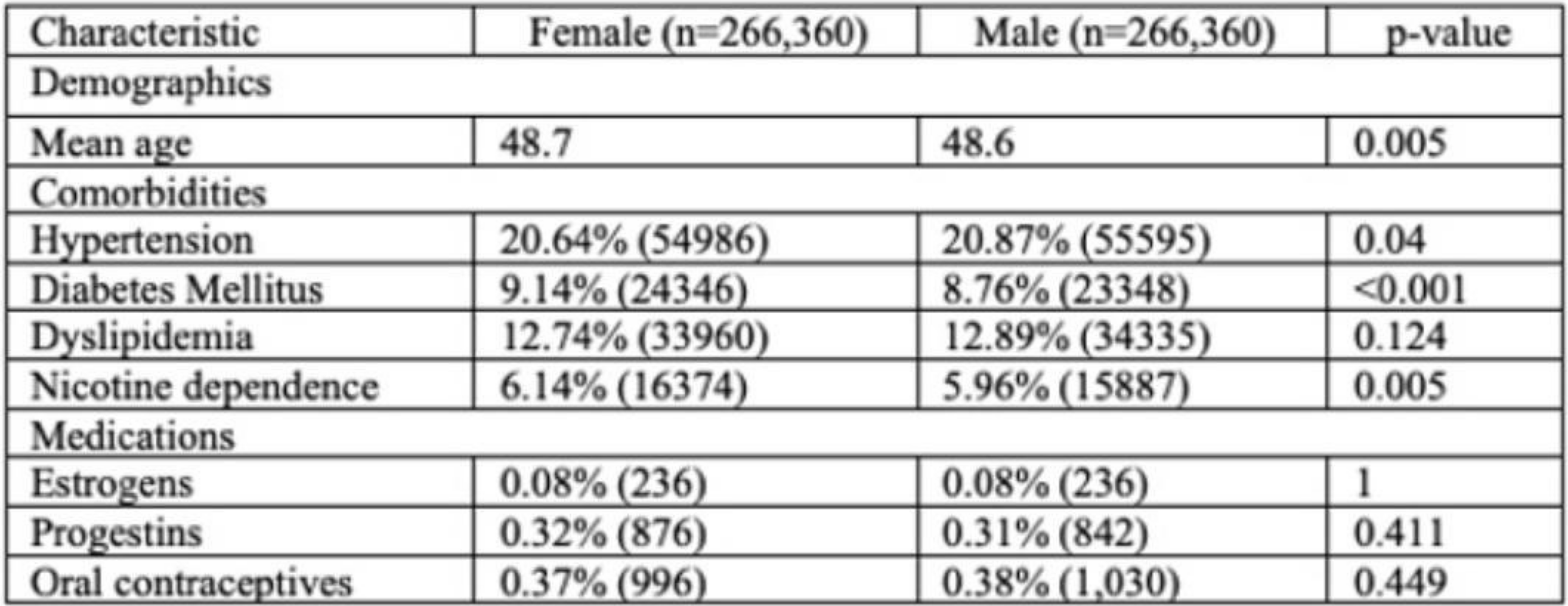Sunday Poster Session
Category: IBD
P1186 - Sex Differences in Cardiovascular and Venous Thromboembolic Complications in Inflammatory Bowel Disease: A Large Multicenter Study
Sunday, October 26, 2025
3:30 PM - 7:00 PM PDT
Location: Exhibit Hall

Reham Aljohani, MD (she/her/hers)
King Faisal Specialist Hospital and Research Centre
Riyadh, Ar Riyad, Saudi Arabia
Presenting Author(s)
Reham Aljohani, MD1, Amani Abualnaja, MD1, Mashary Attamimi, MD1, Abdulelah Almutairdi, MD1, Eman Alrajhi, MD1, Ahmad Nawaz, MBBS2, Badr Al Bawardy, MD3
1King Faisal Specialist Hospital and Research Centre, Riyadh, Ar Riyad, Saudi Arabia; 2SUNY Upstate Medical University, Syracuse, NY; 3Yale New Haven Hospital, New Haven, USA; King Faisal Specialist Hospital and Research Center, Riyadh, Saudi Arabia, New Haven, CT
Introduction: Inflammatory bowel disease (IBD) is a chronic inflammatory condition that affects organs beyond the gastrointestinal tract. Emerging evidence shows an increased risk of cardiovascular disease (CVD) and venous thromboembolism (VTE), despite not having traditional CVD risk factors. It is unclear if there are sex-disparities in risks of CVD and VTE in IBD. This study aims to assess the sex-disparities in rates and outcomes of CVD and VTE in patients with IBD.
Methods: This is a retrospective study that was conducted through TriNetX, a global research network that provides access to multi-institutional databases. We included all patients ≥ 18 years of age with a confirmed diagnosis of IBD between January 1, 2015 and January 1, 2025. Our data was split into female and male cohorts. Propensity score matching (PSM) was performed on demographics, age, relevant medications and CVD/VTE risk factors. Outcomes of interest included myocardial infarction (MI), heart failure, cerebral infarctions, deep vein thrombosis (DVT) and pulmonary embolism (PE).
Results: After PSM, a total of 532,720 patients were included: Female Cohort (n=266,360), and Male Cohort (n=266,360). Baseline demographics after PSM between the two cohorts is shown in Table 1. Mean follow up time in the female cohort was 187.9 ± 161.5 weeks and 179.5 ± 160.4 in the male cohort. Female patients with IBD had a lower risk of developing DVT [odds ratio (OR) 0.927; 95% confidence interval (CI) 0.895-0.960), p < 0.001). Risks of developing MI (OR 0.803; 95% CI 0.777-0.831, p < 0.001) and heart failure (OR 0.914; 95% CI 0.895-0.934, p < 0.001) were lower in female compared to male patients with IBD. There were no significant differences between the two groups in terms of risk of acute PE and cerebrovascular (Table 2).
Discussion: The risks of DVT, MI and heart failure were higher in male patients compared to female patients with IBD in our study. There were non-significant trends for higher risk of PE and cerebrovascular in female patients compared to male patient with IBD. The mechanisms behind this sex disparities in CVD and VTE complications in IBD remain unclear and warrant further investigation.

Figure: Table 1: Baseline Characteristics after Propensity Score Matching in the Female and Male Cohorts

Figure: Table 2: Cardiovascular and Venous Thromboembolic Complications in the Female and Male Cohorts
Disclosures:
Reham Aljohani indicated no relevant financial relationships.
Amani Abualnaja indicated no relevant financial relationships.
Mashary Attamimi: AbbVie – Speakers Bureau. Hikma – Speakers Bureau. Janssen – Speakers Bureau. Lilly – Speakers Bureau. Pfizer – Speakers Bureau. Sandoz – Speakers Bureau. Takeda – Speakers Bureau.
Abdulelah Almutairdi: AbbVie – Advisory Committee/Board Member, Speakers Bureau. Amgen – Advisory Committee/Board Member. Bristol myers squibb – Advisory Committee/Board Member, Speakers Bureau. Janssen – Advisory Committee/Board Member, Speakers Bureau. Lilly – Advisory Committee/Board Member. Pfizer – Advisory Committee/Board Member. Takeda – Advisory Committee/Board Member, Speakers Bureau.
Eman Alrajhi indicated no relevant financial relationships.
Ahmad Nawaz indicated no relevant financial relationships.
Badr Al Bawardy: AbbVie – Advisor or Review Panel Member, Consultant, Speakers Bureau. Bristol Myers Squibb – Advisory Committee/Board Member, Speakers Bureau. Eli Lilly – Advisory Committee/Board Member, Speakers Bureau. Hikma – Speakers Bureau. Janssen – Advisory Committee/Board Member, Speakers Bureau. Pfizer – Advisory Committee/Board Member. TAKEDA – Advisor or Review Panel Member, Speakers Bureau.
Reham Aljohani, MD1, Amani Abualnaja, MD1, Mashary Attamimi, MD1, Abdulelah Almutairdi, MD1, Eman Alrajhi, MD1, Ahmad Nawaz, MBBS2, Badr Al Bawardy, MD3. P1186 - Sex Differences in Cardiovascular and Venous Thromboembolic Complications in Inflammatory Bowel Disease: A Large Multicenter Study, ACG 2025 Annual Scientific Meeting Abstracts. Phoenix, AZ: American College of Gastroenterology.
1King Faisal Specialist Hospital and Research Centre, Riyadh, Ar Riyad, Saudi Arabia; 2SUNY Upstate Medical University, Syracuse, NY; 3Yale New Haven Hospital, New Haven, USA; King Faisal Specialist Hospital and Research Center, Riyadh, Saudi Arabia, New Haven, CT
Introduction: Inflammatory bowel disease (IBD) is a chronic inflammatory condition that affects organs beyond the gastrointestinal tract. Emerging evidence shows an increased risk of cardiovascular disease (CVD) and venous thromboembolism (VTE), despite not having traditional CVD risk factors. It is unclear if there are sex-disparities in risks of CVD and VTE in IBD. This study aims to assess the sex-disparities in rates and outcomes of CVD and VTE in patients with IBD.
Methods: This is a retrospective study that was conducted through TriNetX, a global research network that provides access to multi-institutional databases. We included all patients ≥ 18 years of age with a confirmed diagnosis of IBD between January 1, 2015 and January 1, 2025. Our data was split into female and male cohorts. Propensity score matching (PSM) was performed on demographics, age, relevant medications and CVD/VTE risk factors. Outcomes of interest included myocardial infarction (MI), heart failure, cerebral infarctions, deep vein thrombosis (DVT) and pulmonary embolism (PE).
Results: After PSM, a total of 532,720 patients were included: Female Cohort (n=266,360), and Male Cohort (n=266,360). Baseline demographics after PSM between the two cohorts is shown in Table 1. Mean follow up time in the female cohort was 187.9 ± 161.5 weeks and 179.5 ± 160.4 in the male cohort. Female patients with IBD had a lower risk of developing DVT [odds ratio (OR) 0.927; 95% confidence interval (CI) 0.895-0.960), p < 0.001). Risks of developing MI (OR 0.803; 95% CI 0.777-0.831, p < 0.001) and heart failure (OR 0.914; 95% CI 0.895-0.934, p < 0.001) were lower in female compared to male patients with IBD. There were no significant differences between the two groups in terms of risk of acute PE and cerebrovascular (Table 2).
Discussion: The risks of DVT, MI and heart failure were higher in male patients compared to female patients with IBD in our study. There were non-significant trends for higher risk of PE and cerebrovascular in female patients compared to male patient with IBD. The mechanisms behind this sex disparities in CVD and VTE complications in IBD remain unclear and warrant further investigation.

Figure: Table 1: Baseline Characteristics after Propensity Score Matching in the Female and Male Cohorts

Figure: Table 2: Cardiovascular and Venous Thromboembolic Complications in the Female and Male Cohorts
Disclosures:
Reham Aljohani indicated no relevant financial relationships.
Amani Abualnaja indicated no relevant financial relationships.
Mashary Attamimi: AbbVie – Speakers Bureau. Hikma – Speakers Bureau. Janssen – Speakers Bureau. Lilly – Speakers Bureau. Pfizer – Speakers Bureau. Sandoz – Speakers Bureau. Takeda – Speakers Bureau.
Abdulelah Almutairdi: AbbVie – Advisory Committee/Board Member, Speakers Bureau. Amgen – Advisory Committee/Board Member. Bristol myers squibb – Advisory Committee/Board Member, Speakers Bureau. Janssen – Advisory Committee/Board Member, Speakers Bureau. Lilly – Advisory Committee/Board Member. Pfizer – Advisory Committee/Board Member. Takeda – Advisory Committee/Board Member, Speakers Bureau.
Eman Alrajhi indicated no relevant financial relationships.
Ahmad Nawaz indicated no relevant financial relationships.
Badr Al Bawardy: AbbVie – Advisor or Review Panel Member, Consultant, Speakers Bureau. Bristol Myers Squibb – Advisory Committee/Board Member, Speakers Bureau. Eli Lilly – Advisory Committee/Board Member, Speakers Bureau. Hikma – Speakers Bureau. Janssen – Advisory Committee/Board Member, Speakers Bureau. Pfizer – Advisory Committee/Board Member. TAKEDA – Advisor or Review Panel Member, Speakers Bureau.
Reham Aljohani, MD1, Amani Abualnaja, MD1, Mashary Attamimi, MD1, Abdulelah Almutairdi, MD1, Eman Alrajhi, MD1, Ahmad Nawaz, MBBS2, Badr Al Bawardy, MD3. P1186 - Sex Differences in Cardiovascular and Venous Thromboembolic Complications in Inflammatory Bowel Disease: A Large Multicenter Study, ACG 2025 Annual Scientific Meeting Abstracts. Phoenix, AZ: American College of Gastroenterology.

